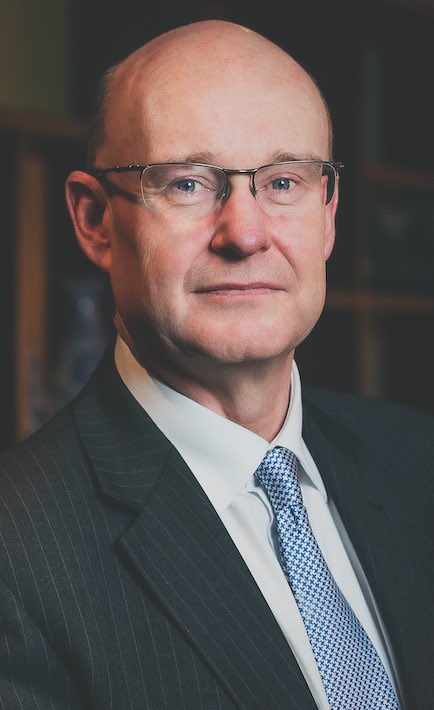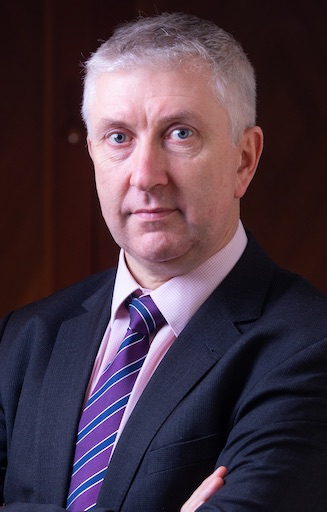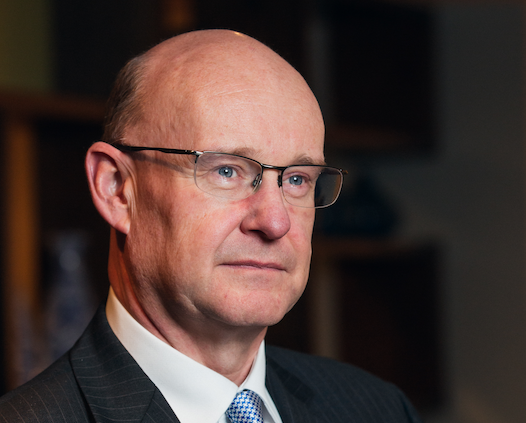Three takes on change
In Views
Follow this topic
Bookmark
Record learning outcomes



With responsibility for health devolved in the UK, the decisions that shape community pharmacy are being made in Edinburgh, Cardiff and Belfast as well as Westminster. The five-year deal in England has made the headlines for the last few months, but pharmacy is changing elsewhere too. The challenges – workload, reimbursement, funding – are the same, but the opportunities for community pharmacists are different. Rob Darracott catches up with the people in the middle.
The chief executive of Community Pharmacy Scotland (CPS) has been in the job for 13 years. Harry McQuillan has a young team keeping him on his toes, a supportive Government, and a new service to land in April.
Everything is relative of course, but Harry McQuillan says community pharmacy in Scotland is “healthy and stable”. “We’re probably coming to a crossroads for service development, and more of a move into secured funding, with less reliance on reimbursement,” he explains. “We still rely on it, but with our sharing arrangement, if we can map money to guaranteed funding we will, because it allows us to rely on a steady income, with more predictable cashflow and the confidence to invest.
“We’re fortunate in having a Scottish Government that is supportive, and while we’ve got that we need to engage in delivery, look at how we can play an equal part in primary care, and become more integrated into service development.”
The direction of travel in Scotland has been set for a number of years. Prescription for Excellence was published in 2013, but it was chief pharmaceutical officer Rose Marie Parr’s prioritised 2017 follow-on Achieving Excellence in Pharmaceutical Care that put community pharmacy front and centre as a key component of the Government’s plans for primary care. Harry says: “First chapter, community pharmacy, where it plays a role. That gave a lift to the network and gave us a focus – if that’s the desire of Government, we need to step up.”
Two years on, progress is being made. A new common clinical conditions service (or Pharmacy First) is due to start from April next year. “The Health Minister [Jeane Freeman] sees us as part of the solution,” Harry says, adding that the Minister has taken a specific interest in the new service, delaying its introduction to make sure all pharmacies had access to an IT platform that would support delivery. “In hindsight, it was a good decision to delay for a year, allowing proper planning to be put in place.”

CPS is now focused on landing the new service next year. “Our whole drive, and the Government’s drive, is for common clinical conditions/Pharmacy First from 1 April. We’re on track. It’s a new service, rather than an expansion of the Minor Ailments Service (MAS) because it will have whole populations in there.” A wider patient dataset will give pharmacists more information with which to assess symptoms.
“We are looking to reward or recognise advice only, referral, or see and treat, and each will carry a weighting,” Harry says. “We will be able to record the interventions pharmacy makes.” This will enable CPS to talk differently about value, he adds. “We’re on track. All contractors I’ve spoken to are supportive.”
It's early stages, but we are looking at some sort of incentive, if you are willing to provide an independent prescribing clinic
He also sees this as the start of a step change for the community pharmacy service. “You’ve got the whole population with Pharmacy First, and you’ve got roughly 200 qualified independent prescribers (IPs) in the community at the minute – some have moved into primary care so we’re doing a survey to see who’s still available – and 63 will qualify next year from Robert Gordon’s and Strathclyde. Part of our negotiations next year will be to maintain that momentum, because I can see Pharmacy First developing to a whole new level with IPs.”
It’s a big ambition. “You could argue you will have a tiered service, but it will only be five, seven years, a decade until the whole network catches up. Pharmacy First, the triage, IP, prepares you then for long term condition management – maintenance initially, management truly in the future. Then I can see a place and a role for community pharmacy, with the advent of digital, wearables, patient generated data, to intervene, with consent and everything else. Then you are into a whole different ball game.”
The full details of the service are still being worked up, but the thinking is clear. “To make it attractive to owners and the front line, we need a service from April. It’s early stages, but we are looking at some sort of incentive, if you are willing, as a community pharmacist, to provide an independent prescribing clinic. If you have that service, you can build on it. Keep the independent prescribing courses going, and we will come online with service to deliver.”
Other building blocks will need to be put in place. “We’re in very early discussions with NES [NHS Education Scotland] about what a foundation programme for community pharmacists would look like and how it might build on the four plus one, or the integrated five year degree. I see knowledge acquisition and registration, a foundation programme for consolidation, IP for advancement, then services to give us delivery, as a continuum. Structuring foundation into IP as a progression into service delivery, that’s the model that in six or seven years could transform the network.” He says its early days for a roadmap discussion, but it’s a compelling vision.
Stability of leadership
I suggest the timescale he’s setting means this strategy might see him retired before it’s complete. He agrees, but he says that the vision is the result of a stability of leadership – like Harry, chairman Martin Green has held his role for 13 years – and therefore there is a unity of purpose across the CPS Board and its team. He’s acutely aware of the importance of continuity.
“We have to guard against all that learning going at the same time. Martin has another two years of his current term to run, I’ve got however long they’ll have me, but it has to be managed.” Harry says he has worked hard over the past 13 years to ensure more of a spread of engagement across the organisation as a means of de-risking it and building resilience for the future. “I’ve got good people – now it’s about enhancing that. Making sure we develop people, bring new skills in.” Those new skills now see two pharmacy technicians on the CPS team. “It keeps us current,” he says.
Having a young team is a challenge he clearly relishes. “It brings a different dynamic. They keep you on your toes. When people ask me what’s the challenge for the organisation, it’s to keep it current. If you go to a restaurant and it says, ‘restaurant of the year 2009’, are you looking forward to your dinner coming?’ It’s the same with us. We’re proud of our awards from 2009 and 2012, but what’s relevant today, what’s new, what do we want to tell our membership? That’s a challenge for us.”
Members will be watching the public health space with interest. Harry sees opportunities. “Vaccination is tentative in Scotland compared with the rest of the UK.” CPS is waiting for the results of this year’s pilots in Lothian and Glasgow. Interestingly, GPs are keen for pharmacy to take on travel vaccines, with only three available on the NHS. “We just need to get the vaccine transformation programme to agree,” Harry says.
As in the rest of the UK, patient safety is a major activity. “The Quality Improvement in Pharmacy Practice Collaborative brings together the Royal Pharmaceutical Society, ourselves, NES, the Yellow Card Scheme, Health Improvement Scotland, all around the one table to discuss ‘how do we improve safety’ with the same language. We tell the network ‘this is important’, these are the outputs we expect to see delivered, NES come in with the support tools, we bring information from primary care to it, that’s been extremely useful.”
Looking forward to next year, I ask Harry what would represent success for him in 2020. “We deliver to 1,257 pharmacies a Pharmacy First/common clinical conditions service,” he says. “We’re not underestimating what that will be like, getting the population to see us as the first port of call. It would be a huge step forward for primary care. And I’d want to see the organisation as resilient, still current, engaged.”
He’s got an eye slightly further ahead too. “If you’d asked me about 2025, I’d like to see the network more engaged in the whole digital thing. We think about digital being an app that’s going to allow you to order your repeat scripts. But that’s not going to change the model. What do we do that’s unique in that space?” He says CPS is working with a couple of companies to look at what the digital future for community pharmacy could be. “I see it as a way of intervening differently. The network is the same, but your focus on intervention changes from ‘will I look after you’ to ‘how well I look after you’.” Digital means data, and Harry sees data as key to opening many doors. “We knock the door of the NHS and ask ‘can we have your information, but I can see a time when the NHS knock our door and asks the same question. To flip that relationship would put us on a very different platform, because then they want you in, rather than you trying to get in.”
Community Pharmacy Wales director of contractor services Judy Thomas says pharmacies have plenty to be positive about for now, with a supportive Assembly, a new service rolling out, and building blocks for more, although big challenges are never far away.

Ever since the Welsh Government stated that it was not going to implement a consequential cut in the Welsh contract following the 2015 decision in England, community pharmacy in the Principality has been on a different path.
“Pharmacy is very positive in Wales,” says Judy Thomas. “We have pretty much cross-party support, the Minister is on board with everything, and we are three years, in theory, into our transition period. We are repurposing the £20m, which was roughly the equivalent if exactly the same cut in England had taken place here.”
That positive statement led to action. “The money has been protected, but how it is coming back to pharmacies is different,” Judy says. “We have had significant amounts going into enhanced services. The Common Ailments Service (CAS) has rolled out now to pretty much the whole estate (703 out of 716 pharmacies).” The rest can come on board when they are ready; most have space issues which make a consultation room difficult to achieve.
Other services are coming too. “Sore throat test and treat is starting to roll out. It will be in the majority of pharmacies that offer CAS, although it won’t be in every one to start with because you have to be delivering CAS at a certain level to get it. That’s to make sure it works smoothly for patients, and that pharmacists are au fait with the general service before they have the add on.” The roll out will take time, as training for the service is face to face, and includes an assessment of clinical skills.
Winter pressures
Judy says the service is the result of a lot of hard work from CPW. “We had a lot of conversations with Assembly Members about how community pharmacy could be part of the answer to winter pressures. If all sore throats went to pharmacy that could alleviate some of the pressures on GPs. We had discussions at party conferences, and the evaluation earlier this year was exceptionally positive so that made that decisions easier for people. It also fits the direction of travel in Wales in stopping people going to the wrong places for unscheduled care. There was a 99 per cent positive response from patients. GPs loved it too.”
The break with the English contract is almost complete, although reimbursement, still England and Wales, is challenging. “We are hearing from contractors that even though money has gone into Category M they are not feeling that. Although the CPW chair is a member of the PSNC negotiating team, those are PSNC and Department of Health discussions and CPW as an organisation sits outside them. Everything else is Wales only, now England are changing MURs,” Judy says.
It’s not sustainable to keep moving money out of practice-based payments into other things...we’re getting to a tipping point
“Our quality and safety scheme is different; this year it’s £5,000 per contractor, split into four quarters, with specific things in each quarter to get the money. That’s been well received. This is the first year we’ve had action planning. This year they’ve had to review the results of their high-risk medicine surveys. Now you can have a collaborative working discussion with your GPs – we’ve had those for a couple of years. Those conversations, where they work well, start to grow CAS, and will help drive people into smoking cessation services.” Judy says 98-99 per cent of contractors received the quality payments in the first two quarters.
Live services
The Discharge Medicines Review (DMR) service is live everywhere as an advanced service, and is growing, Judy says. “If you are connected to a hospital which uses the Medication and Transcribing E-Discharge system (MTED), you can get an electronic discharge letter straight to the pharmacy, which is fantastic. The pharmacy then gets a message through the NHS alert system which says you have a patient sitting on the Choose Pharmacy platform, so you can go and get the information and start the service.” It is hoped that hospitals in Wales not yet using the MTED system should get a fix in the near future, through new digital investment across the country.
“The newest thing is the continuity payment. Since October, pharmacists who offer the CAS for the full hours of 60 per cent or more of the days they are open, will receive a £500 payment for that month. The percentage will go up in January (to 70 per cent) and again in April (to 80 per cent).” The reasoning is simple – continuity payments help cement a transition from choosing to provide a service to being a fundamental part of the care system, and drive people into service delivery. “You have to have it available,” Judy says.
Payments for CAS are also changing. “They were weighted to get people to start, but are now weighted towards delivery, so the more you do the more you get paid,” Judy says. “The majority of pharmacies have gone live with the CAS platform and over 680 have delivered and have patients registered, so we are not far off them all having experience of it too.” Now CPW is waiting to see how the service pans out over time – patients maintain a registration for a year then drop off, so pharmacies that consistently deliver will keep their registrations (and banded payments) up.
Asked about CPW’s agenda for the next couple of years, a new contract is the big one, with conversations just starting. “It’s not sustainable to keep moving money out of practice-based payments into other things, where most of it is only paid at 15 per cent fair return, which means significant investment to end up with the same money. We’re getting to a tipping point.
“We’ve had a series of engagement events to ask contractors what they think should be kept, what they would like to see in the contract, and what they would need to make that happen,” Judy says. “We have huge amounts of suggestions, lots of which are service based. There is an appetite for the investment in independent prescribers to continue, and for more clinical services, like sore throat test and treat.”
CPW would like 15 months to agree a deal, and a year to plan for implementation on 1 April 2022. “We have some contractors who think that’s too far away, we have others who want to understand what that funding looks like now. Financially, contractors are struggling, so they want a new solution – next month. But a big bang would be disastrous; we need to take people with us.
“The priorities for us are to get a contract that gives sustainability to the network, and which protects its position, which embeds us in a supply function while capitalising on the other services we can do, including building on CAS. The Welsh Pharmacy vision, which is in the background, included an independent prescriber in every pharmacy, which will need new funding.”
Like Scotland, Wales is investing in independent prescribers in community pharmacy. “The first funded IPs are just starting new services now. We have an interim specification for an acute conditions IP service, there is a service also being developed for contraception as well – Cardiff, in particular, has a real problem with the capacity of their sexual health service. It’s early days, and we have to take GPs and others with us, but we’ve worked with the health boards to create a transition service, so while IPs are waiting for their annotation, and before they have their number and pads, they can work in GP practices, in a protected environment with someone down the corridor they can ask, and where they can build relationships.”
Across the UK, the pharmacy workforce is under pressure, with the move into GP surgeries pulling pharmacists out of other areas. Judy says Wales is no different. Finding pharmacists in North Wales has got more difficult; Wales also feels the impact from the investment in primary care and practice pharmacists in England. “Community Pharmacy Northern Ireland published their survey a while ago about how challenging it is. We’ve been discussing whether we need something similar. There are plans in Wales to increase the number of pre-reg places. September 2020 is the first intake into Swansea [School of Pharmacy]. That will make a big impact, but we are looking at 2025 before they qualify.”
I ask Judy the same question about where she and CPW would like to be in a year’s time. Judy ends on a positive: “I would hope by this time in 2020 we will have a clear direction of travel for a new contract, and potentially be piloting some things, and starting to get that noise back from contractors that they’re on board and we’re going in the right direction.”
Community Pharmacy Northern Ireland chief executive Gerard Greene says the absence of representative Government has not halted community pharmacy development, though it doesn’t make it easy.
Community Pharmacy Northern Ireland (CPNI) signed a memorandum of understanding (MoU) with the Department of Health (NI) and the Health and Social Care Board (HSCB) in January 2017, just before the Northern Ireland Assembly collapsed. The timing was fortunate. “The important thing for us was that some policy context was defined and put in place before that happened,” says Gerard Greene.
 “As you know Ministerial statements and policy directions set down by Ministers form the roadmap officials take forward. While we don’t have political oversight presently, there is the Health and Wellbeing 2026 Delivering Together vision document, our contractual framework and the MoU and Ministerial statement are all there on the record. Those documents all give us the blueprint. We are progressing the service development programme; economic metrics have been established. We are not starting from scratch, so when we have the Assembly back we can hit the ground running.”
“As you know Ministerial statements and policy directions set down by Ministers form the roadmap officials take forward. While we don’t have political oversight presently, there is the Health and Wellbeing 2026 Delivering Together vision document, our contractual framework and the MoU and Ministerial statement are all there on the record. Those documents all give us the blueprint. We are progressing the service development programme; economic metrics have been established. We are not starting from scratch, so when we have the Assembly back we can hit the ground running.”
The need for urgent action was highlighted over the Summer as MPs in Westminster on the influential backbench Northern Ireland Affairs Committee devoted a complete section of their Health Funding in Northern Ireland report to community pharmacy, calling upon the Department of Health to “agree a sustainable funding package for community pharmacy based on the findings of its own cost of service investigation and implement a Drug Tariff based on Northern Ireland’s unique set of circumstances”.
The Committee’s intervention is important, says Mr Greene. “In the absence of an Executive here in Northern Ireland, in terms of influence of elected representatives, the default port of call is MPs. The significance is that it is not just a report of Northern Ireland MPs. This is a wider cross party grouping from across the UK, and they’ve picked up on the difficulties in the community pharmacy sector. For community pharmacies, who have had a difficult journey over the last eight or nine years, the way in which those difficulties have been captured was heartening. “
The absence of a Minister has stalled a dialogue that had seen community pharmacy recognised in policy documents for the first time in a number of years. Gerard explains: “Of the 18 action points for delivering the vision for the health service over the next 10 years in Health and Wellbeing 2026, two referenced community pharmacy. That’s hugely significant for us. That means we have a fighting chance. Like other primary care providers, pharmacy is trying to get its share of limited resource. You never get it easy, so you have to take the opportunities as they present.
“It has been difficult for the profession here, but we have kept a steady course over the last 10 years. We have always approached our dealings with health officials in a professional way. We know community pharmacy has an important role to play in helping the health service deliver services to patients within the transformational agenda. We are consistent in our approach. You have to keep at it, sometimes you have to wait for something to bear fruit,” he says.
It’s about listening to members, to the public and to the wider health sector and then weaving a path through it all
CPNI has to take some credit for that? “We take our steer from the contractor base and we then develop a vision and a commitment to delivering on that vision,” Gerard says. “Everybody works together, and we take a collaborative approach to working with all the stakeholders. That’s what our committee has done. It’s been a long journey, we’ve had bumps along the way, but we have tried to keep the eye a bit further down the track on the medium and longer term objectives.“
He has praise for his committee, which blends new faces with an experienced core group to be representative of all contractors, geographies, and pharmacy group size. “I’m mindful that we can’t deliver everything everybody would like all the time, but it’s about listening to members, to the public and to the wider health sector and then weaving a path through it all, while bringing all sections along on that journey,” he says.
Gerard has had an affiliation with CPNI which goes back 20 years. He’s been the chief executive for the last 10. “I have a very good team around me within CPNI, and a very committed board,” he says. “There’s many cogs in the wheel and I’m only a very small one. Everybody brings ability, dedication, desire and a team working approach. I try to give staff an opportunity to push their boundaries, and once I find that they are more than capable, I allow them to get on with it.”
Three key challenges
CPNI is currently facing up to three key challenges, Gerard says. “Contractors are no different to those in other parts of the UK. They are struggling with finances, with workload and with workforce demands. I have to be live to their immediate problems, while turning to work with a health service that doesn’t have the same agility.” He says CPNI has an important role in keeping people engaged, motivated and looking forward.
Over the last eight weeks, nine service development roadshows, run in collaboration with the Department of Health and HSCB, facilitated by the NI Centre for Postgraduate Learning and Development (NICPLD), demonstrated how the service development programme is being taken forward, the design of the services, and the direction of travel for future service provision. Gerard says all stakeholders recognised the importance of taking this roadmap out to the profession.
He details progress. “The flu vaccine administration pilot service for health service workers in the west is underway, the carer support signposting service is operational in the south east area, there’s an alcohol brief interventions pilot service, another pilot on acute cough assessment incorporating CRP (C-reactive protein) testing and a hypertension detection service pilot. Those have all initiated in various parts of Northern Ireland, and that’s to extend the pharmacy offer and gather the evidence that demonstrates their value for wider roll out and commissioning.
“We are also looking to prioritise the roll out of a regional emergency supply service and expanding the Pharmacy First service building on the winter pressures pilot initiated this time last year and which ran to the end of March. We had a mild winter last year, so the numbers didn’t go through as expected, but I think all parties saw this was something that should also be a feature for community pharmacy this winter.” He hopes that while the service is regional this year, it can be moved onto a more expansive service beyond just the winter pressures conditions.
“In terms of the newly commissioned Living Well service, the Public Health Agency have been extremely pleased with the response of the sector to the two-monthly themed health promotion and intervention programme. Other people can now see the huge impact we can have in the public health agenda,” Gerard says.
Earlier in the year, CPNI held contractor meetings around the funding difficulties, with departmental and HSCB officials present. “There has been a long period here of funding instability, and there is now wider recognition that fault lines exist. What we want to do is prioritise stabilisation of the sector to enable sustainable future development. It was great that the officials came along, the contractor base listened, were very respectful, but the messages from contractors were very clear,” he says.
But it is workforce where contractors face acute difficulties, so much so that Gerard raised the issue at an All Party Pharmacy Group meeting in Westminster a couple of months ago, outlining the results of a recent CPNI survey which revealed a present shortfall of 320 community pharmacists across Northern Ireland’s 532 community pharmacies.
“There are several reasons for the current difficulties,” Gerard says. “Numbers of new registrants are reducing, younger pharmacists are opting to travel and work, for example in the Republic of Ireland, and the ongoing recruitment of practice-based pharmacists have all had a devastating impact on the availability of pharmacists within the community pharmacy sector. A further wave of practice pharmacist recruitment is likely, and will only exacerbate the current crisis.”
The knock-on effect is obvious. “We are saying to the Department and Board, yes, we are committed to the community pharmacy development plan, but we need to be mindful of capacity limitations which mean the uptake of service provision may not necessarily as high as we would like it to be. Lower metrics should not be interpreted as a sign of apathy, it’s more a reflection of community pharmacy teams trying to manage a complex workload with a reduced workforce.
“We are looking first and foremost for the Department and HSCB to stabilise the network. Contractors are struggling to pay their bills and retain experienced staff. Additional funding will provide some headroom for retaining hugely important team members.
“Pharmacists are managing more and more patients beyond the traditional dispensing roles. People are living longer, they have more complex co-morbidities and are on multiple medications. If pharmacists can help manage those patients in the community, it will alleviate pressure on overstreched GPs, out of hours, hospital services. Our message is clear: you cannot afford not to invest in the sector. MPs on that committee recognised that and could see that community pharmacy wasn’t being utilised to the full. We can look at the big things, but we need to stabilise it first.”
